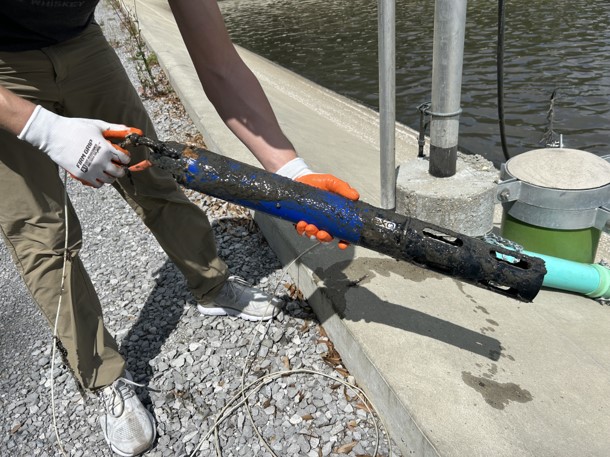Research
Areas of Interest
Water Quality and Energy Remote Sensing for Rural Wastewater Treatment Ponds



Energy optimization using water quality parameters will be analyzed in two different projects using deployable YSI sensors in a municipal treatment pond and in conjunction with a floating photovoltaic unit in the wastewater stabilization pond. Wastewater treatment and stabilization ponds have long detention periods for water to filter through multiple ponds for anaerobic and aerobic processing. Our team will investigate the influence on parameters including water temperature, nitrates, turbidity, TSS, ammonium, and dissolved oxygen at multiple sites to understand the correlation of variables. YSI units at the immediate floating platform site and in the adjacent pond area will be used to determine if the platform and shading of the FPV unit have an influence on water quality. Wastewater treatment ponds rely on microbial processing to break down organic matter. These microbial communities have several factors that affect processing efficiency including temperature, evaporation, and oxygen demand. The temperature gradient for optimized microbial processing is between 68°F and 95°F. In Louisiana, wastewater treatment facilities have difficulty in summer with high temperatures resulting in ineffective processing thus elevated nutrient and total suspended solids leading to algae production. For wastewater treatment facilities, algae production can drastically increase operation, maintenance, and removal costs due to ineffective microbial processing. To mitigate algae production, shade balls are used to reduce sunlight penetration and evaporation in irrigation and wastewater ponds. In this case, the FPV units will provide a sunlight barrier, stabilizing the temperature, reducing algae production, and mitigating evaporation loss from the pond increasing the overall health of the system.
Wastewater Effluent Characterization from Aquaculture Processors
The progressive culture of environmental sustainability demands manufacturers to minimize their negative social and environmental impact but provides an inadequate framework for innovative solutions to waste issues. There are 350 permitted aquaculture (or seafood) industries in Louisiana that have an economic impact of $2.4 billion annually. Most aquaculture processors are in remote areas with direct water access to best serve their fishing suppliers, thus leaving waste and wastewater infrastructure lacking. These rural areas are surrounded by agricultural land that provides an economic impact of $11.7 billion annually for the state. This proposed project will generate preliminary data by molecular fingerprinting the dissolved organic matter (DOM) in isolated research areas to synchronize current faculty expertise in coastal and agricultural disciplines and promote collaboration on cumulative data sets for overlapping environmental systems. The DOM characterization will provide traceable avenues for a waste valorization network for Louisiana communities by promoting renewable alternatives for fertilizer and modeling for the current and estimated transport of organic matter in the environmental ecosystem. Additional elemental analysis and characterizing the amino acid composition of protein-enriched aquaculture wastewater effluent will identify fluorescent indicators and nutrient composition of wastewater effluent. By synchronizing the team's multidisciplinary expertise, the proposed research will enhance Louisiana's sustainability and resiliency footprint by providing regional networking for aquaculture processors' waste streams as agricultural fertilizers and assessing the impacts of organic matter on our state's environmental ecosystems.
Nutrient Runoff and Retention from Agricultural Farms



Louisiana has a diverse landscape of agriculture and industry that can have equal economic and environmental impacts. With such a rich landscape of agriculture and the need for supplementation compounds to manage crops and soil, the runoff has an immediate impact on local tributaries and waterways that converge with both recreational users and the aquaculture industry. The Louisiana Department of Environmental Quality (LDEQ) produced a Water Quality Integrated Report that shows sources and impairments in Louisiana waterways to focus on mitigation techniques. The range of manufacturing communities in the state provides a unique, renewable source of waste byproducts that can be utilized for research. Examples of waste valorization opportunities are sugar mills (bagasse), shrimp processors (ground shrimp shells), coffee manufacturers (coffee husks), and lumber mills (sawdust). These manufacturing will have disposal costs for these waste products, but research will provide an avenue for secondary market capabilities of their waste as sorbent materials. This project focuses on the need to address water quality issues identified by the LDEQ by using waste valorization from industry to provide non-hazardous waste materials for the sorption of contaminants and nutrients. The benefit to both industry and agriculture can be seen by the closed economic loop created by using materials produced in the state to help mitigate upstream issues. The state relies on its resources for economic benefit, and this proposed research provides data to understand how waste valorization from our industries can aid agriculture in the best management practices of runoff.